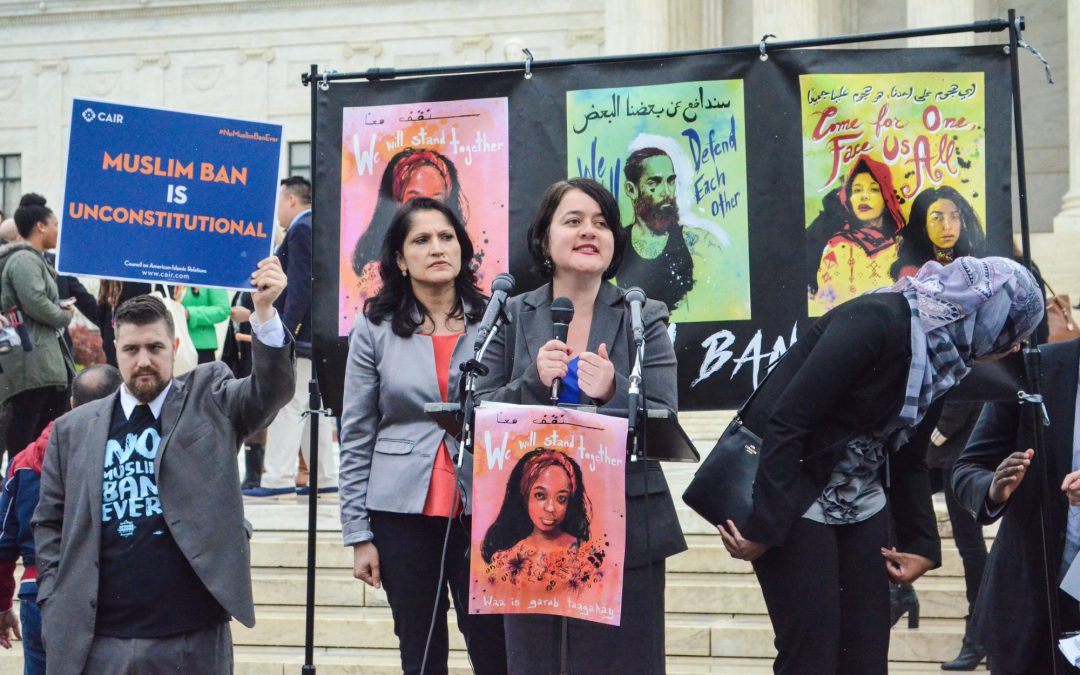WASHINGTON – The Supreme Court heard arguments Wednesday that President Donald Trump exceeded his authority in issuing a travel ban against eight countries, but a Justice Department lawyer said the ban is based on national security requirements and isn’t unconstitutional because foreigners don’t have First Amendment rights.
On Sept. 24, 2017, Trump issued a proclamation that imposed tailored restrictions on U.S. entry by nationals from Iran, North Korea, Syria, Chad, Libya, Yemen, Somalia and Venezuela. Hawaii, three individuals and a nonprofit organization sued, arguing the ban violated the Immigration and Naturalization Act and the First Amendment prohibition against religious discrimination. A federal court ruled in favor of Hawaii and imposed a nationwide injunction against the ban.
The attorney for Hawaii argued the executive order illegally conflicts with laws passed by Congress, discriminates against individuals based on their nationalities and violates the First Amendment.
“Congress is in the driver’s seat when it comes to immigration,” said Neal K. Katyal. “This executive order transgresses the limits that every president has done with this proclamation power since 1918. And to accept it here is to accept that the president can take an iron wrecking ball to the statute and pick and choose things that he doesn’t want for purposes of our immigration code.”
But Solicitor General Noel J. Francisco said Department of Homeland Security recommended restrictions on countries that failed to provide needed information about their nationals. “What we’re talking about is very basic pieces of information. Not the ideal, but the minimum,” he said. “Are they reporting terrorism history information? Are they reporting criminal history? Do they cooperate with us on a real-time basis?”
Katyal argued that Congress already passed a law to protect against terrorists entering the U.S. through more rigorous screening, procedures to make countries comply and regular reviews of the process.
Trump’s order discriminates on the basis of nationality on 39 percent of visas issued, Katyal said. “It’s not a small part. It’s a large part. And it is the most important part because immigrant visas are about, you know, what the nation becomes. It’s people who want to come here and become part of our long-term polity. This executive order flatly contradicts that.”
Justice Sonia Sotomayor said Congress addressed the ban by adding another layer of review for countries that support terrorism, requiring the nationals from these countries to get permission from the attorney general and the secretary of the state. “Where does a president get the authority to do more than Congress has already decided is adequate?” she asked.
Francisco argued the provisions of the Immigration and Naturalization Act give Trump the authority to impose such restrictions.
“The whole vetting system is essentially determined by the executive branch,” he said. “It’s up to the executive branch to set it up. It’s up to the executive branch to maintain it. And it’s up to the executive branch to constantly improve it.”
Sotomayor also said the plaintiffs called the ban unconstitutional because it was based on dislike of a particular religion. “And I thought the Establishment Clause at its heart is that we cannot be anything but neutral with respect to religion or its practice.”
Francisco responded that the proclamation is not discriminatory against Muslims because it omits Muslim countries that met the baseline of information required for U.S. visas. “The proclamation reflects a foreign policy and national security judgment that falls well within the president’s power.”
Chad was recently dropped from the list because it met the baseline, which reflects the proclamation was successful “to move those countries across the line into acceptability,” Francisco added.

